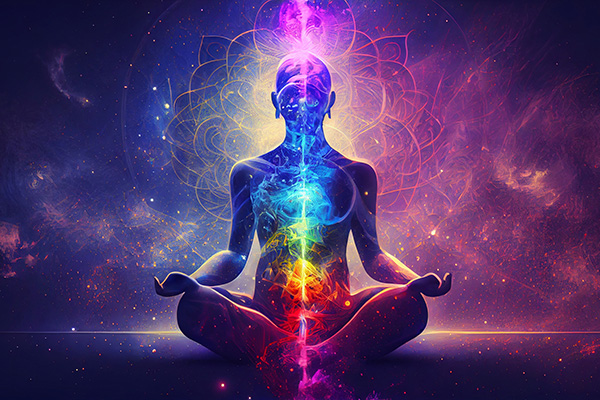visualization
Transform Your Energy With Color Meditation
 Did you know that color therapy can balance and enhance your life emotionally, physically, and spiritually? It’s true! Colors are not just visual experiences. They are frequencies of light that interact with our own energy field, impacting how we feel, think, and behave.
Did you know that color therapy can balance and enhance your life emotionally, physically, and spiritually? It’s true! Colors are not just visual experiences. They are frequencies of light that interact with our own energy field, impacting how we feel, think, and behave.
Through the ages mystics, healers, and shamans have known what modern holistic practitioners are rediscovering: color is a potent healing tool.
From the fiery strength of red to the tranquil peace of blue, the visible spectrum offers a rainbow of resources for personal transformation. Every color carries its own vibration, and these subtle energies can be harnessed intentionally to support healing, clarity, and spiritual growth.
It can be used to stimulate your chakras, enhance your aura, and create harmony between your inner and outer worlds.
One profoundly effective way to connect with the power of color is through visualized meditation. When you consciously focus on a specific color during your meditation practice, you create a sacred bridge between intention and manifestation.
This focus calibrates your energy field to resonate with the energetic essence of that color to benefit your mind, body and soul.
The key to using color effectively is to align it with your current emotional or energetic needs. For instance, if you seek renewed optimism and joy, immerse yourself in the golden glow of yellow. Feeling emotionally tender or overwhelmed? A soft green can soothe and restore your heart. Rich reds can energize and ground, while blues invite calm and clear expression.
A Step-By-Step Guide To Manifesting True, Lasting Love
 Have you been asking yourself: Does he love me? Is he into me, like I am into him? Where is my life partner, my soulmate? Is my person ever going to come into my life?
Have you been asking yourself: Does he love me? Is he into me, like I am into him? Where is my life partner, my soulmate? Is my person ever going to come into my life?
We all want that amazing, healthy relationship where we feel desired, respected, appreciated, and deeply connected. There’s nothing wrong with wanting a love that feels like it was written in the stars.
But many people don’t really know how to get there. If you’re feeling a bit lost about where to start, or confused about why love hasn’t shown up for you yet, you’re not the only one.
No matter how down you might feel, your desire for deep, lasting love is very much possible.
One of the first steps is to stop doubting your own value. Feeling unworthy is one of the main reasons many people do not meet their person.
You’re totally worthy of the kind of relationship you’re after. Yes, you! And it can start right now.
Sometimes the underlying issue is subtle, like a limiting belief, an old emotional wound, or a vibrational mismatch between what you want and what you’re actually putting out there. Other times, it’s just that you haven’t quite tapped into your manifesting power yet.
Here’s the thing: love isn’t something you chase. It’s something you align with. Everything you think, feel, and do contributes to how you see your world. True love wants to find you. You just need to meet it halfway. It all starts with self-awareness, a mindset shift, and the courage to heal what’s been holding you back.
Manifest Your Best Life While You Learn To Meditate
 Meditation is an ancient, time-tested practice that offers remarkable health benefits that can profoundly impact our overall well-being and happiness.
Meditation is an ancient, time-tested practice that offers remarkable health benefits that can profoundly impact our overall well-being and happiness.
It can also shape our daily reality in powerful ways. A regular meditation practice can improve your ability to manifest your wishes and desires.
Meditation is a conduit for life-altering experiences with seld and spirit. It opens a line of communication with the universe that is both thrilling and comfortingly familiar. It offers wisdom, clarity, and peace, inviting you into a deeper relationship with your own divinity.
Unfortunately, many people struggle to make meditation a daily habit because it challenges modern habits of constant stimulation and relentless productivity. In a society that values busyness, the idea of “sitting still” or “doing nothing” can feel strange or uncomfortable to many.
Another major barrier is the common misconception that meditation requires a completely “cleared mind.” This sets an unrealistic expectation.
When you consider daily distractions, lack of time, and uncertainty about how to begin, it’s easy to see why so many people don’t meditate. However, the beauty of meditation is that it meets you where you are, and no perfection is required.
One of the most enduring myths about meditation is the belief that your success hinges on completely clearing your mind and eliminating all thoughts. In reality, this is just one type of meditation, and it’s a particularly difficult one to master!
From Resentment To Radiance: The Power Of Forgiveness
 As a Kundalini yoga instructor, I’ve come to understand forgiveness as much more than just an act of kindness or compassion. It is a sacred healing practice — an essential release and transmutation of toxic energy held within the subtle body.
As a Kundalini yoga instructor, I’ve come to understand forgiveness as much more than just an act of kindness or compassion. It is a sacred healing practice — an essential release and transmutation of toxic energy held within the subtle body.
My work as a Reiki healer and psychic reader has deepened my understanding of this concept. I’ve witnessed firsthand how unresolved emotional pain, bitterness and resentment can create stagnation in our energetic pathways, dimming our vitality and obstructing our intuitive abilities.
In both healing sessions and psychic readings, I’ve seen forgiveness spark remarkable shifts in people’s physical, mental, emotional and spiritual well-being.
In the Kundalini Yoga tradition, forgiveness is not merely a moral ideal. It is a profound energetic cleanse. When we cling to resentment, anger, or betrayal, we create dense energy imprints, or emotional residue, in our aura and chakras, especially around the heart center (Anahata). These blockages disrupt pranic flow, dull intuitive perception, and limit our capacity to experience divine love.
My yoga teacher, Yogi Bhajan, often reminded us that the fastest route to healing and happiness is to forgive completely and limitlessly. He taught that true forgiveness requires releasing the subconscious “recordings” and emotional patterns etched into both hemispheres of the brain — patterns that replay pain and perpetuate karmic loops. “Forgive, release, learn, love, and excel,” he would say. Continue reading
A Beginner’s Guide To Astral Projection
 Every spiritual tradition speaks of a world beyond our own — an ethereal realm that exists just beyond the veil of the physical senses. Whether it’s Nirvana in Buddhism, Asgard in Norse mythology, or the Elysian Fields of the ancient Greeks, these higher dimensions are seen as places of transcendence and divinity.
Every spiritual tradition speaks of a world beyond our own — an ethereal realm that exists just beyond the veil of the physical senses. Whether it’s Nirvana in Buddhism, Asgard in Norse mythology, or the Elysian Fields of the ancient Greeks, these higher dimensions are seen as places of transcendence and divinity.
Traditionally, such realms are associated with the afterlife, but that’s only part of the story. The truth is that we don’t have to die to access them. These higher planes of existence can be explored while we are still very much alive.
While mystics, shamans, and seers have spoken of these realms for millennia, modern science, particularly in the fields of quantum theory and consciousness studies, is beginning to acknowledge the possibility of multiple dimensions, parallel realities, and alternate timelines. Phenomena such as déjà vu or lucid dreaming, for example, may be brief collisions between timelines or conscious overlaps with other dimensions where versions of ourselves already exist.
So how do we consciously access these mystical realms? The practice of astral projection — also known as astral travel, out-of-body experiences, or lucid voyaging — is one way to do just that.
The idea of consciously traveling beyond the physical body has appeared in various cultures and spiritual traditions throughout history. Although interpretations vary, many civilizations have incorporated the concept into their myths, religious practices, and mystical philosophies.
Why Positive Affirmations Really Work
 You often hear spiritual people talk about using affirmations to improve their lives. Maybe you’ve seen quotes online or heard advice like, “Just repeat positive affirmations every day and watch your life change!”
You often hear spiritual people talk about using affirmations to improve their lives. Maybe you’ve seen quotes online or heard advice like, “Just repeat positive affirmations every day and watch your life change!”
But have you ever wondered what it really means? It sounds simple enough — but how can repeating a few positive statements really make such a big difference, especially when it comes to something as big (and sometimes complicated) as love and romance?
Let’s start at the beginning: What exactly are affirmations? Simply put, affirmations are short, powerful statements that you intentionally repeat to yourself, usually to create a positive shift in your thinking and mindset.
Affirmations are best phrased in the present tense — as if what you want is already true — to help “install” these intentions or beliefs in your subconscious mind and thus shift your energy. For example, “I am worthy of love,” “I am confident and magnetic,” or “I attract healthy, supportive relationships.”
At first, saying affirmations may feel a little strange or even wrong — especially if your current inner dialogue is filled with self-doubt or fear. But with consistent practice, something amazing begins to happen. You’re not just saying empty words-you’re literally rewiring your brain and shifting your energy to match what you want.
But how does it work? How can repeating just a few words every day change the way you attract love or make that special someone finally notice you? Let’s explore both the scientific and the magical, metaphysical aspects of affirmations and uncover why they work and how you can use them to seriously level up your love life!
Balance Your Mind With Crystal Energy
 The human brain is a dual force, with the left and right hemispheres complementing each other to create a balanced mind.
The human brain is a dual force, with the left and right hemispheres complementing each other to create a balanced mind.
Each side of the brain brings its own gifts to the whole, working together to shape our unique perceptions and experiences.
The left brain is known for its logical, structured, and analytical approach to processing information, excelling in tasks like reasoning, mathematics, and language.
In contrast, the right brain is more intuitive, imaginative, and emotionally expressive, fueling creativity, visual thinking, and spiritual insight.
This division of cognitive function influences how we think, solve problems, and interact with the world, both internally and externally.
In the realm of energy work and healing, various crystals and stones support and enhance the natural strengths of each brain hemisphere, promoting overall mental and emotional harmony and balance.
Whether you are seeking increased focus for problem solving or a boost in artistic expression, the right combination of crystals can support a harmonious mind that fosters both intellectual and creative growth.
By setting clear intentions and using the appropriate crystals and stones regularly, you can harness their energies to align both hemispheres of the brain and promote an integrated approach to life.
In this sacred balance, the mind and soul find unity, creating a deeper sense of wholeness and fulfillment—a fusion of logic and intuition, structure and flow, thought and feeling.